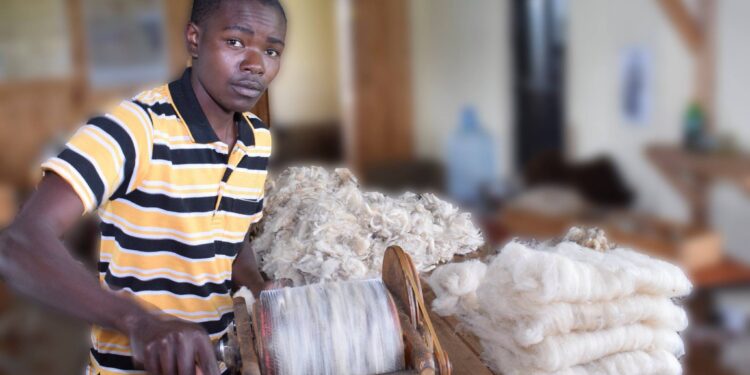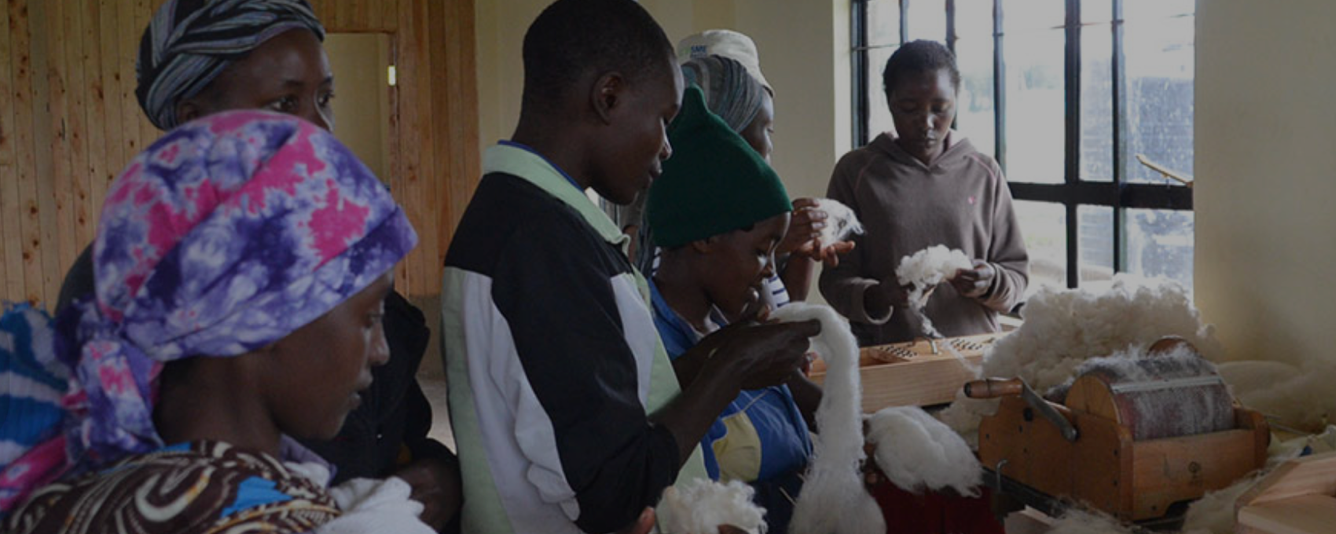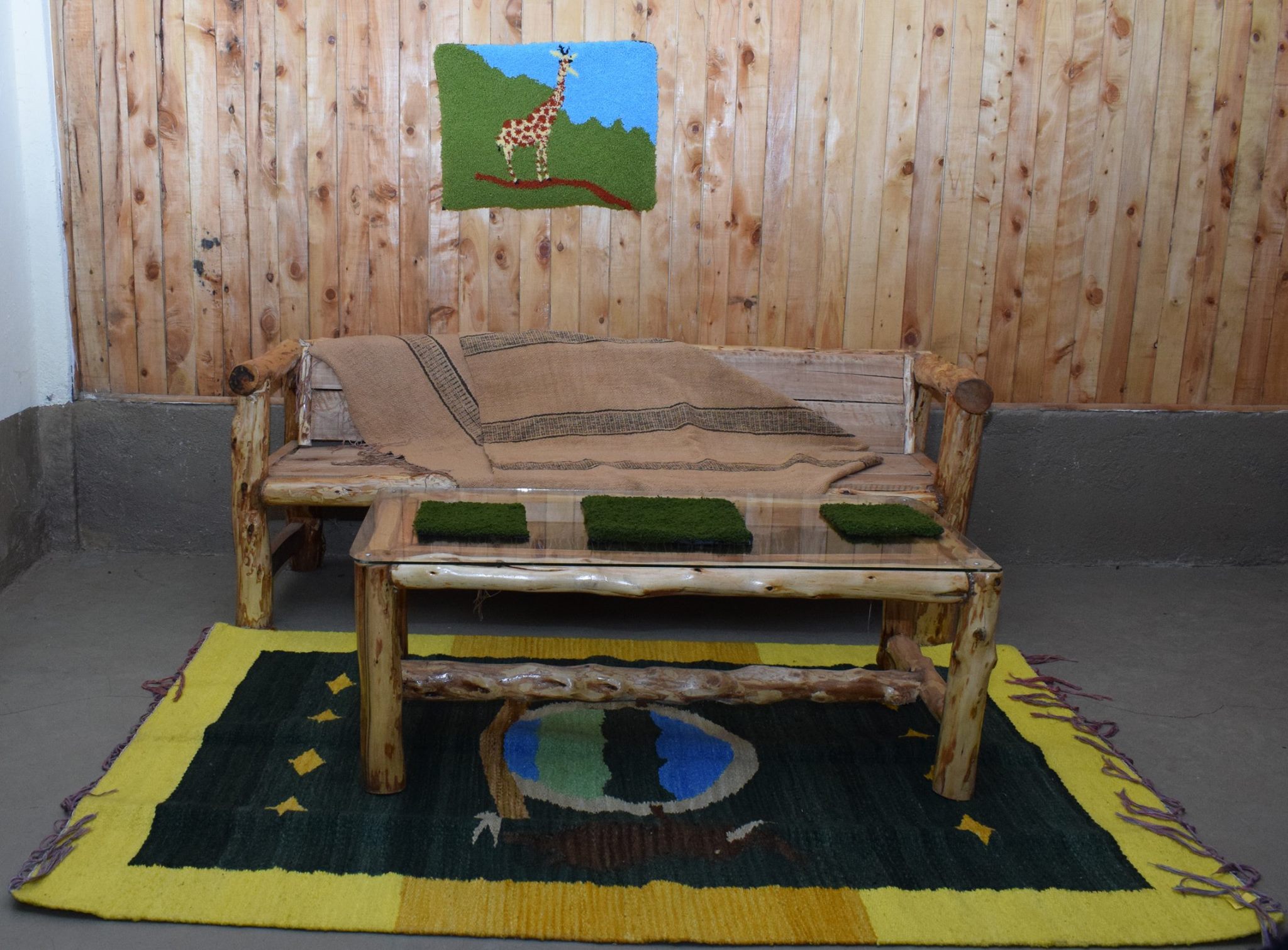
Samuel Bakari is an entrepreneur from Kenya. He is the founder of Njabini Wool Crafters, a cooperative society born in 2004 as a tool for the conservation of the grasslands in Kenya, which are essential for agriculture and habitat biodiversity. These unique grasslands are home to the special Sharpe’s Longclaw bird, an endangered species, who requires for its survival grass tussocks for feeding, roosting, and nesting. Unfortunately, the Longclaw has been severely affected by changes in land use, from traditional livestock farming to crop cultivation.
Njabini works alongside farmers, educating and encouraging them to manage sheep properly. At the same time, they create an opportunity for farmers to increase their income at the household level while taking care of nature. Their mission is to bring together youth, local community members, and farmers with a common interest in improving the value of wool.

When the business was born, no one had some sort of expertise on entrepreneurship or business development. They needed specific skills to manage the business, so Samuel decided to participate in the E4Impact Accelerator Program in Nairobi, which really helped the development of the business a lot.
“E4Impact Accelerator program was beneficial because it helped us think like an enterprise and build a model for Njabini Wool crafters.” he stated.
But let’s learn more about Samuel and its cooperative.
1. How was your Business Idea born?
It’s a long history and it is connected to the conservation of the grasslands, particularly the Sharpe’s Longclaw. We realized that this bird is located in the grasslands, where farmers were only practicing sheep layering or pasture, leaving aside pastures for sheep layering, which serves as a habitat for the birds. It was very apparent that the conservation message was not “sitting well” with the farmers, so we started looking for avenues to convince them. Around that time, we realized there was an excellent opportunity for wool, since most farmers have sheep for their meat. We looked and saw an ample chance there, so that’s how we started the wool production. The main thing was to bring the conservationist together with the farmers and have the same result.

2. How can your business improve the life of the beneficiaries of your activities?
We have several beneficiaries. The first ones are the people we employ directly, like the young ladies who work as spinners, weavers, and marketing officers at the workshop. The other beneficiaries are the sheep farmers, as we buy wool from these households every year. They are all earning immediate income. If you look at the employment opportunities in the rural areas, the possibilities are very low, and the payment is not good. We give employment options to these people and provide them with a living wage. On top of this, we have a sheep breed improvement program that directly improves the quality of the meat. This means that with the farmers we are working with, we have an average payment for their meat, increasing the farmers’ household income.
3. What has been the main challenge you had to overcome in your entrepreneurial experience?
I am not sure if we have overcome this challenge, but we are trying to improve. This enterprise started with people who did not have any skills in entrepreneurship and were mainly driven by conservationist passion. John, my colleague, and I both have an ecological background and we are the leading operators of the business. This has been a challenge because we do not have a background in business operations. Once we have sufficient funds, we want to bring in someone who knows more about business and has more skills in this area.
The other challenge is the gap between the market and education. We have carpets and rugs, which are primarily sold in Nairobi since more people are willing to purchase them. But since we are located in an urban area, local people are less inclined to buy our products, so the main problem is the distance.

4. In your opinion, what are the main qualities an entrepreneur should have?
I think it is very important to be genuine. You need to understand what the client wants and provide them with good service. You need to be mindful of the client’s needs and be attentive to their concerns.
5. Is there a person you are inspired by, i.e., an entrepreneur or a particular mentor?
There is one Kenyan woman that inspires me a lot, and her name is Tabitha Karanja. She is the creator of Keroche Breweries, a company specialized in the production of wine and beer. Many people would think this is not a good industry, but I like her attitude because of her resilience. She is competing with big enterprises, some of them are even government-oriented enterprises, and despite this, she is doing very well.
6. What would you suggest to a new-born entrepreneur?
I would suggest to any entrepreneur, especially a new-born entrepreneur, to be patient. It takes a lot of time to see steady growth in your enterprise. Also, commitment because it takes a lot to bring together an enterprise to be successful.

7. Could you tell us a particular satisfactory moment you had in your entrepreneurial activity?
I think I’ve had a lot, but probably the most important one and the one that makes me the happiest is the change of attitude from the farmers who own the grasslands. This was one of our main objectives, so this made us very excited. Looking back at the times when we started to talk to the farmers and explain to them the importance of the grasslands for the birds, they would reply things like “we don’t care for the birds” was hard. But when we came in with the wool spinning and the improvement of the sheep industries, most farmers started to think and be part of the conversation. So even when we stopped talking about the birds and talking more about sheep, the farmers wanted us to talk more about birds, because they understood their importance.
The other moment is related to the people that are involved in the cooperative. Most of the time, we work with ten farmers every year, sometimes even twenty, sometimes thirty, depending on the market opportunities. And of course, the ladies and the young men working as weavers and spinners in the workshop. These are people who have a chance to make an income. This, for me, is a priceless moment.
8. Could you tell us how the E4Impact Accelerator program has helped you and your business?
I think one of the main advantages was the ability to learn from peer entrepreneurs, understanding what they are doing and how we can learn from them. The other one is the processes, the business structure, the ability to track the finances, the ability to look at the production process, and the marketing processes. Finally, the ability to diversity in our business and create different product lines. In the end, this was very helpful for us.
Learn more about Njabini:
Website: www.nwc.co.ke
Facebook page: Njabini Woolcrafts
Instragram account: @kenyanwool
Twitter profile: @njabinicrafts
